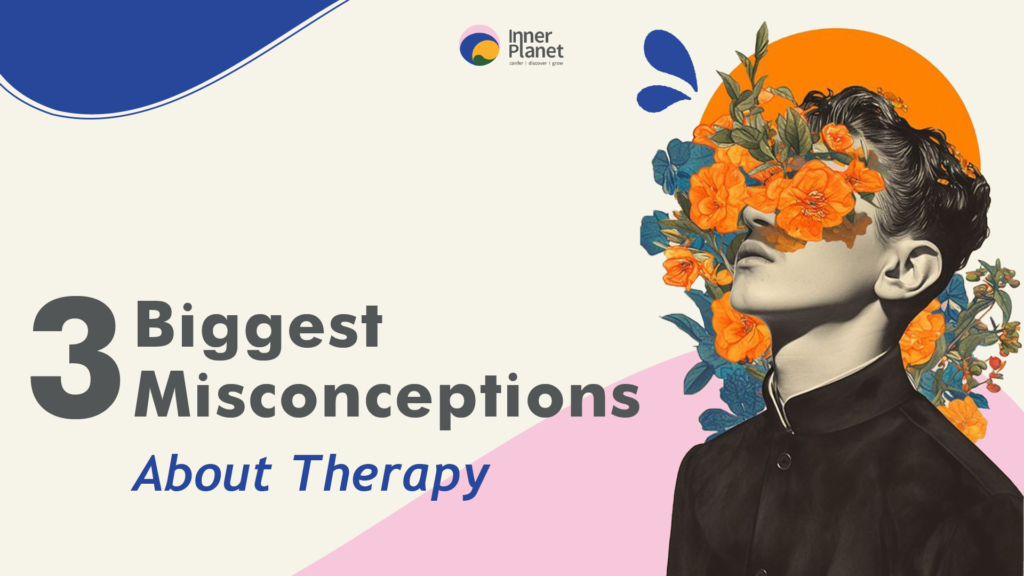If you’ve ever found yourself wondering whether therapy is really for you, you’re not alone. Maybe a part of you has been curious—Could this actually help me?—but another part pulled back, unsure, doubtful, even a bit resistant.
That hesitation makes perfect sense. For years, therapy has been wrapped in a cloud of myths and misunderstandings. Most of us grew up with vague, sometimes dramatic ideas about what it is, who it’s for, and what it actually does. And when something feels unfamiliar, it’s only human to fill in the blanks—often with assumptions, because they’re easily available.
So let’s challenge some of the most common misconceptions about therapy and take an honest look at the kind of mental health care many people avoid… simply because no one ever explained it clearly, until now!
1. “If I start therapy, I’ll be stuck in it forever”
This is such a common thought—and we completely understand why.
It’s easy to imagine that therapy is an open-ended commitment. That once you begin, you’re signing up for something that drags on endlessly. That you’ll spend years digging through your past with no real progress in sight.
But therapy isn’t about being stuck. It’s about getting unstuck.
The truth is, many forms of therapy today are designed to be short-term and goal-focused. For some people, a handful of online therapy sessions is enough to gain clarity, find relief, and move forward with more confidence. For others, therapy can be a helpful anchor during a particularly tough phase.
You’re not locked in. You’re in charge. And you can stop anytime it stops feeling useful—because therapy is meant to serve you, not trap you.
2. “Therapy is just talking—how is that supposed to help?”
We get it. You might think, “I’ve got friends I can talk to. What’s different about therapy?”
Here’s the thing: therapy isn’t just venting. It’s not someone nodding silently while you spill your guts. It’s a skilled, structured, and deeply intentional process guided by someone trained to expertly listen—and help you see things from angles you hadn’t even considered.
A good counselling psychologist doesn’t tell you what to do. They help you figure out what you want to do, and why it’s been hard to do it. They help you notice patterns you didn’t realise were there, and give you tools you didn’t know you had.
And yes, talking helps. Talking in a space where you’re truly heard, supported, and never judged—that kind of talking can heal in ways we rarely experience elsewhere.
3. “Therapy is for people with serious problems—not people like me”
This might be the most widespread and quietly damaging myth of all—the one that keeps so many people from the support they deserve.
Maybe you’ve told yourself: “My life isn’t that bad.” Or, “Other people have real problems. I should be able to handle this.”
But here’s the truth: therapy isn’t about how bad things are. It’s about how hard they feel. And everyone—at some point—feels overwhelmed, confused, stuck, or simply tired. You don’t need a crisis to deserve support. You don’t have to “qualify” to feel heard. You just have to be human.
And more than that—nothing even has to be “wrong.”
Therapy isn’t only for pain; it’s for progress. It’s a space where people come to learn emotional intelligence, deepen self-awareness, sharpen their coping skills, and better understand why they respond to life the way they do. It’s for exploring your inner world, discovering blind spots, and making more intentional choices.
Some of the most powerful therapy doesn’t start in crisis. It starts with curiosity.
And sometimes, the bravest thing you can do for yourself is not to wait until things get unmanageable, but to simply say, “I want to understand myself better.”
If you’ve believed any of these myths, that’s completely okay. You were simply working with the information you had. But now, hopefully, you see therapy for what it truly is: a practical, empowering, and deeply human tool for navigating life with more ease.
There’s no shame in wanting to feel better. No weakness if you feel the need for help.
There is strength in honesty—and courage in reaching out.
Want to find out more about therapy? We’re always just a call away! Ready when you are.


